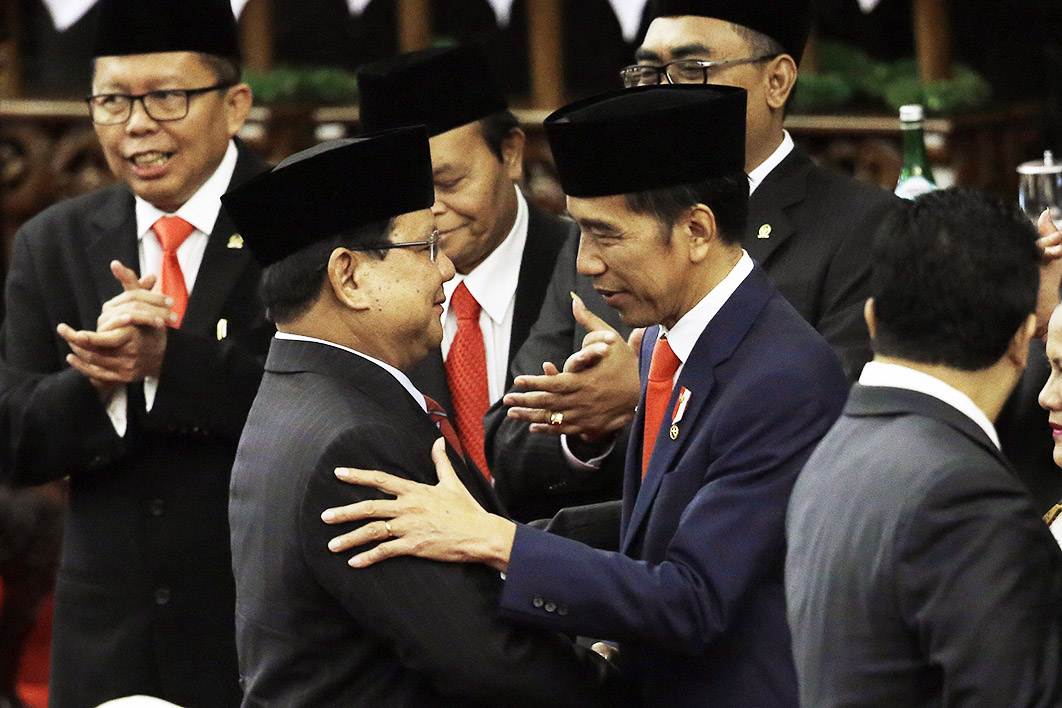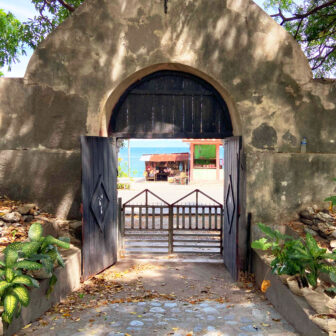You could forgive Joko Widodo for wanting his presidency to last forever. With the traumas of the pandemic shoved into the past, economic growth back, inflation in check, and poverty and inequality trending downwards, “Jokowi” is enjoying his highest-ever approval ratings.
A huge domestic market, favourable demographics and vast reserves of newly “critical” minerals mean the fundamentals are there for Indonesia to become one of the world’s five biggest economies by mid-century. Despite its enormous governance and development problems, there’s a sense that the facts of Indonesia’s economic and geopolitical importance are finally catching up with its elites’ pretensions about their status as leaders of a negara besar — a great, important country.
It’s in this feel-good atmosphere that Indonesia is set to choose a replacement for Jokowi, who’s constitutionally limited to two five-year terms, in presidential elections scheduled for February next year.
Spare a thought for the opposition’s candidate, the former Jakarta governor Anies Baswedan. Once a close ally of the president, Anies stoked Muslim grievances to win the 2017 gubernatorial polls in Jakarta after the Chinese-Christian incumbent was accused of blasphemy. Anies’s standing among religious minorities — about an eighth of the national electorate — has been at rock bottom ever since. That’s a big enough problem on its own without the strategic challenges involved in running as a repudiation of a president whose approval ratings are hovering in the high 70s.
Those numbers aren’t the only ones posing a problem for Anies. Indonesia’s electoral laws apply a “presidential threshold” that requires candidates to be nominated by a party or coalition of parties that won either 20 per cent of the popular vote or 25 per cent of seats at the previous legislative elections. Anies has secured the backing of three parties that together meet this threshold, but if he loses just one he’ll be off the ballot.
The one party for which the nominating threshold isn’t a problem is PDI-P, the nationalist party Jokowi is at least officially a member of. Having won just over 20 per cent of the popular vote in 2019, it’s unilaterally put forward its star cadre Ganjar Pranowo, the telegenic governor of Central Java province.
Ganjar has charted a Widodo-like path to national popularity, having used local politics as a platform to build a national profile based mostly on his personal charm, competent administration and avoidance of scandal. Not for nothing have Indonesian pundits been pre-emptively labelling a Ganjar presidency as Jokowi jilid dua — “Jokowi volume two.”
Just like Jokowi, PDI-P is also Ganjar’s biggest liability. The party’s chair, former president Megawati Soekarnoputri, feels that Jokowi hasn’t repaid her with the obedience she considers to be her due given her role in making him president in 2014. Determined not to have another of her cadres assert their independence once in office, Megawati has tested Ganjar’s loyalties by forcing him into taking a high-profile stand against the government while publicly belittling him as a “party functionary.” Ganjar’s poll numbers have stagnated as many voters — not to mention Jokowi — have come to see him as a cipher for Megawati, who remains a polarising figure outside the PDI-P base.
This is all to the advantage of defence minister Prabowo Subianto, the candidate polls suggest would be the favourite if the election were held now. Having fought and lost two brutal presidential campaigns against Jokowi before being co-opted into his second-term cabinet, Prabowo is in the unique position of being able to promise continuity while remaining the lesser of the two evils for Anies’s voters in the event their candidate doesn’t make it on to the ballot or is eliminated in the first round of Indonesia’s two-round voting system.
Eight months out from the election, in short, Jokowi has got all three likely candidates exactly where he wants them: Anies struggling while Ganjar and Prabowo compete for the aura of being the president’s natural successor. Which raises a question: with the opposition weakened and the contest likely to involve two government-linked candidates promising more of the same, is anything at all at stake in this election?
To say these elections are a “test of democracy” might be too much of a cliché, but it’s telling that twenty-five years after the fall of Soeharto every Indonesian national election is still routinely described in those terms. Certainly, despite the resilience of Indonesian democracy in the face of unfriendly odds, Jokowi leaves some of its foundations looking unsteady.
That 2024’s polls are even taking place as scheduled shouldn’t be taken for granted: Jokowi, despite public denials, lent behind-the-scenes support to an unsuccessful push in 2021–22 to extend his term in office via constitutional amendment. And if Anies Baswedan’s candidacy falls over before it can be officially registered in November 2023, it will be an open question whether it was because his coalition lost confidence in his ability to turn around his polling numbers or because his bid was sabotaged by the government sabotage. His nominating parties have been rocked by suspiciously timed corruption investigations and lawsuits, while Anies himself is a potential target of corruption charges relating to financial decisions he made as governor of Jakarta, despite dubious evidence of illegality.
Even if unsuccessful, a president’s efforts to evade term limits and his authorities’ harassing the opposition with legal threats aren’t exactly the hallmarks of a healthy democracy. But underhanded tactics like this are of a piece with Jokowi-era democratic backsliding, wherein the president’s “personal distaste for contentious politics” has dovetailed with the illiberal reflexes of the cops, soldiers, religious leaders and Soekarnoist ideologues who surround him.
One reason to doubt that Ganjar Pranowo would oversee a rehabilitation of democratic norms is that PDI-P looms large within this illiberal milieu. The party has demanded that Ganjar allow it to appoint its cadres to a suite of senior cabinet positions if he is elected. On his watch PDI-P would seek to entrench its influence at the commanding heights of the Indonesian state, continuing to push a “hyper-nationalism” it sees as the antidote to the increasing influence of conservative Islam in society.
Ganjar’s likely response to the threat of being dominated by PDI-P would be to do what Jokowi has done for nine years: counterbalance and dilute its power by co-opting as many parties as he can into his cabinet (with the implicit promise that they can siphon money out of the programs they administer) and cosying up to the police force and military — none of which spells good things for the quality of governance.
The disappointments of the Jokowi years and the dim prospects for democratic renewal under Ganjar provide the backdrop for relitigating the question of whether Prabowo Subianto still represents a unique menace to the system, and whether he ever did.
It helps the cause of Prabowo revisionism that he’s been on his best behaviour since being appointed defence minister. He’s moderated his angry-outsider pose and distanced himself from the Islamic radicals he previously courted, while getting sympathetic press for his efforts to boost Indonesia’s military capability. It might be intuitive to assume that his support is concentrated among older voters nostalgic for the Soeharto era, but Prabowo’s voter base in fact skews young. To many in a generation too young to remember his New Order incarnation, he looks like a worldly, straight-talking patriot beholden to nobody.
Those with longer memories know what lies below the surface: an explosive temper; a penchant for demagoguery, risk-taking and rule-breaking; and, as a former special forces officer in Soeharto’s army, a comfort with the use of violence as an instrument of politics. These features of his character could make Prabowo unpredictable in a domestic or international crisis.
But what Prabowo might do patiently and deliberately could be just as insidious. In the Jokowi years, corruption has become a central talking point for conservatives, who say that the immense cost of running for office in Indonesia encourages politicians to monetise their positions once elected — and for this reason direct elections for local executive positions (and, a few say, the presidency) ought to be limited or abolished.
It’s this context that had me in a suspicious frame of mind when I saw Prabowo say, in a recent interview, that “frankly, we have to study the democracy we’re implementing… the cost of doing politics is too expensive.” He agreed with his interviewer’s observation that this expense was incentivising corruption, saying that “instead, in the end, our political system isn’t making Indonesia a great, advanced and prosperous country, but could wreck it.”
He went on to call for “political parties, social organisations, religious leaders [and] intellectuals” to come together to “study and [consider] what do we want to fix” about the political system. He compared such an effort to the BPUPK, a body set up in the dying days of Japan’s wartime occupation to “prepare” Indonesia for independence, which became a central site for negotiating the constitutional underpinnings of the Indonesian republic proclaimed by Soekarno in 1945: not only between Islamists and secularists, but between democrats and their adversaries.
Prabowo’s offhanded invocation of this formative period in Indonesia’s political history could merely be pretentious — or it could be a hint of the scale of the political changes he imagines himself leading as president. At stake in February’s election, then, is the chance for Indonesia to find out. •




